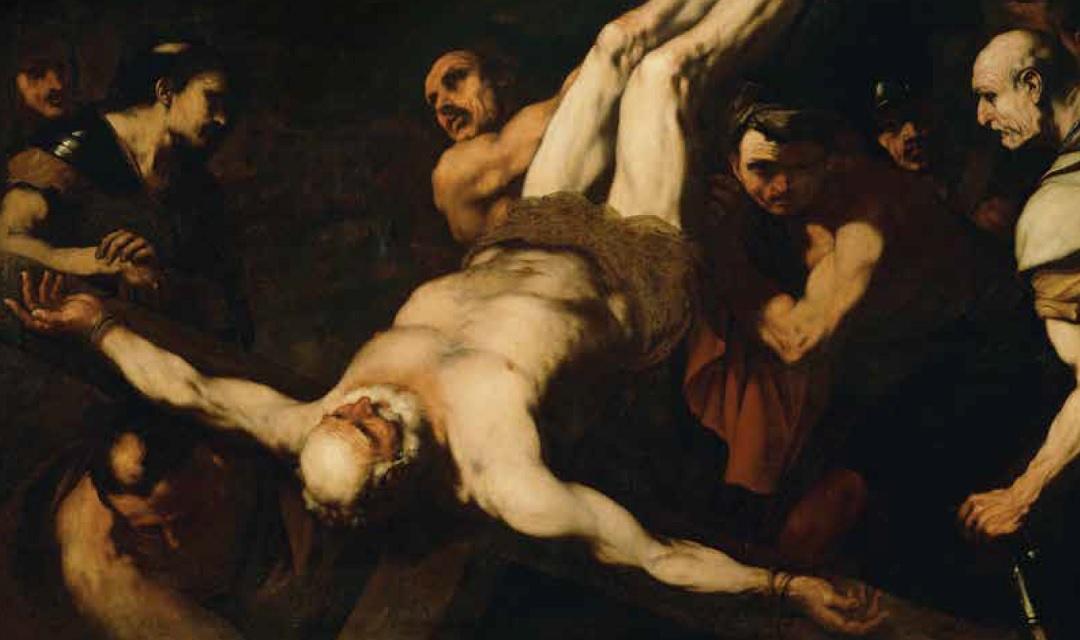This article first appeared in the Christian Research Journal, volume 39, number 02 (2016). The full text of this article in PDF format can be obtained by clicking here. For more information about the Christian Research Journal, click here.
SYNOPSIS
The willingness of the apostles to suffer and die for their faith is one of the most commonly cited arguments for the Resurrection. Yet what is the evidence they actually died as martyrs? Two key initial points need to be made.
First, the apostles believed that Jesus of Nazareth had risen from the dead because they had seen Him alive after His death by crucifixion. Their convictions were not based on secondhand testimony, but firsthand experience. Second, there is good reason to believe the first Christians were persecuted. The apostles publicly proclaimed the resurrection of a crucified criminal with full awareness of what their actions might cost them.
There are two early and general claims that the apostles died as martyrs. Second-century church father Polycarp and fourth-century Syrian father Aphrahat both claim that the apostles were in fact martyred. Although we may not know the specific identities of the actual lesser-known apostles who were martyred, these two sources provide evidence that some of them were executed for their faith.
Furthermore, there is the highest possible probability that Peter, Paul, James (the brother of Jesus), and James (the son of Zebedee) died as martyrs. There is less evidence for Thomas, although his martyrdom is more probable than not. And there is slight positive evidence for Andrew. The evidence for the rest of the apostles is late, legend-filled, and contradictory. We simply don’t know what happened to them.
The key, however, is their willingness to suffer and die for their beliefs. The apostles were not liars. They truly believed Jesus had risen from the grave, and they were willing to suffer and die for that conviction.
If you have followed popular level arguments for the Resurrection (or ever heard a sermon on the apostles), you’ve likely heard this argument. Growing up I heard it regularly and found it quite convincing. After all, why would the apostles of Jesus have died for their faith if it weren’t true?
Yet the question was always in the back of my mind: how do we really know that they died as martyrs—that they were killed for their testimony about Jesus Christ? What’s the evidence? I first began researching this question as part of my doctoral dissertation at Southern Baptist Theological Seminary. Recently I published my research in an academic book titled The Fate of the Apostles.1 The goal of this article is to summarize my findings and help clarify the argument for apologists.
CLARIFYING THE ARGUMENT
The best place to begin our inquiry is by carefully defining the argument. Here is how I frame it in The Fate of the Apostles:
The apostles spent between one and a half and three years with Jesus during his public ministry, expecting him to proclaim his kingdom on earth. Although disillusioned at his untimely death, they became the first witnesses of the risen Jesus and they endured persecution; many subsequently experienced martyrdom, signing their testimony, so to speak, in their own blood. The strength of their conviction, marked by their willingness to die, indicates that they did not fabricate these claims; rather, without exception, they actually believed Jesus to have risen from the dead. While in and of themselves these facts prove neither the truth of the Resurrection in particular nor Christianity as a whole, they do demonstrate the apostles’ sincerity of belief, lending credibility to their claims about the veracity of resurrection, which is fundamental to the case for Christianity. In other words, their willingness to face persecution and martyrdom indicates more than any other conceivable course their sincere conviction that, after rising from the dead, Jesus indeed appeared to them.2 (Emphasis in original.)
Notice that the success of the argument does not rest on proving that all the apostles died as martyrs. In fact, it is not possible to do so, as we will see. Rather, the argument rests on their willingness to suffer and die for their belief in the risen Jesus, which demonstrates their sincerity. And the fact that we can historically show that some of them did die as martyrs, and none recanted, only strengthens this case.
Of course, many critics misstate or misunderstand the argument. University of Notre Dame professor Candida Moss, for example, claims that Christians “like to think of their martyrs as unique. The fact that early Christians were willing to die for their beliefs has been seen as a sign of the inherent truth of the Christian message….Christianity is true, it is said, because only Christians have martyrs.”3 But this is mistaken on two accounts. First, the claim is not that Christians alone have martyrs, but that the apostles died uniquely for the belief that they had actually seen the risen Christ, which demonstrates the sincerity of their convictions. The fate of others for their religious causes in no way undermines the evidential significance of the deaths of the apostles.
Second, the apostles’ willingness to die for their beliefs does not demonstrate “the inherent truth of the Christian message,” but that the apostles really believed that Jesus had risen from the grave. The apostles could have been mistaken, but their willingness to die as martyrs establishes their unmistakable sincerity. The apostles were not liars; rather, they believed they had seen the risen Jesus, they were willing to die by this claim, and many actually did die for it.
DID THE APOSTLES HAVE A RESURRECTION FAITH?
Before considering the evidence for individual apostles, it is necessary first to lay some groundwork and context. Their willingness to suffer and die is evidentially significant only if they had a resurrection faith. In other words, we need to show that the apostles believed because they had seen (or believed they had seen) the risen Jesus.
The earliest accounts all claim the apostles were eyewitnesses of the risen Jesus. When a replacement was chosen for Judas, one necessary criterion was that the person had seen the risen Lord (Acts 1:21–22). Paul and James the brother of Jesus were also eyewitnesses (1 Cor. 15:3–8). Their convictions were based not on secondhand testimony but on the belief that they had seen the resurrected Christ with their own eyes.
From the apostles forward, there is no evidence for an early Christian community that did not have belief in the Resurrection at its core. The centrality of the Resurrection can be seen by considering the earliest Christian creeds, the preaching in Acts, and the writings of the apostolic fathers.4
Thus, James Dunn rightly concludes, “It is an undoubted fact that the conviction that God had raised Jesus from the dead and had exalted Jesus to his right hand transformed Jesus’ first disciples and their beliefs about Jesus.”5
WERE THE FIRST CHRISTIANS PERSECUTED?
Persecution against the first Christians provides a helpful setting for evaluating the likelihood of the martyrdoms of individual apostles. Even though persecution was sporadic and local, there is evidence that the public proclamation of the faith could be costly. John the Baptist was imprisoned and beheaded (Matt. 14:1–11). Jesus was crucified. Stephen was stoned to death after his witness before the Sanhedrin (Acts 6–8). And Herod Agrippa killed James the brother of John (Acts 12:12), which led to the departure of the rest of the Twelve from Jerusalem. The first statewide persecution of Christians was under Nero (AD 64), as reported by Tacitus (Annals 15.44:2–5) and Suetonius (Nero 16.2). The apostles publicly proclaimed the resurrection of a crucified criminal with full awareness of what their actions might cost them.
The apostles should not have been surprised that they faced persecution. Jesus taught that His followers would suffer for the sake of righteousness, and be killed as Israel had killed the prophets, for their proclamation of the name of Jesus before men.6 Suffering was a central theme in the life and teachings of Paul.7 And as I discuss at length in The Fate of the Apostles, the expectation of suffering and persecution is a central theme through the New Testament, Old Testament, and pre-Christian Jewish literature such as 2 Maccabees. There was an anticipation during the first century AD that prophets would suffer and die at the hands of their own people as well as secular authorities.
EVIDENCE FOR THE MARTRYDROM OF THE APOSTLES
There are two early and general claims by church fathers that the apostles died as martyrs. In his Letter to the Philippians (c. AD 120–130), Polycarp refers to Paul and the other apostles who “are in the place they deserved, with the Lord, with whom they also suffered” (9:2). The clear implication is that Paul suffered and faced a martyr’s death as Jesus and Ignatius8 did. Polycarp links their examples together as models for the Philippian Christians to imitate. Bart Ehrman indicates that Polycarp was aware of a tradition in which Paul and the other disciples died as martyrs.9
Also, fourth century Syrian father Aphrahat says:
Great and excellent is the martyrdom of Jesus. He surpassed in affliction and in confession all who were before or after. And after Him was the faithful martyr Stephen whom the Jews stoned. Simon (Peter) also and Paul were perfect martyrs. And James and John walked in the footsteps of their Master Christ. Also (others) of the apostles hereafter in diverse places confessed and proved true martyrs.10
These two passages certainly don’t prove the apostles died as martyrs. In fact, most of the apostles are not even named. And it is not clear exactly what Polycarp means by “apostle,” since he includes Paul, who was not one of the Twelve. And Aphrahat seems to indicate that John was martyred along with his brother James, which does raise questions about the reliability and source of the tradition. But these two references do provide (somewhat) early evidence for a tradition that the apostles were in fact martyred.
THE FATES OF THE APOSTLES
In The Fate of the Apostles, I examine the historical evidence for each apostle and rate the likelihood of his martyrdom on a ten-point probability scale that ranges from not possibly true (0–1) to highest possible probability (9–10). Historical research deals with probability and not certainty. And so my estimates are based on a careful assessment of the quantity and quality of the available evidence for each apostle. The common narrative is that all the apostles except John died as martyrs for their faith. While this may be true, it cannot be demonstrated historically.
In fact, here is what I believe the historical record reveals:
Highest possible probability (9–10): Peter, Paul, James son of Zebedee, James brother of Jesus
More probable than not (7): Thomas
More plausible than not (6): Andrew
As plausible as not (5): Philip, Bartholomew, Matthew, James (son of Alphaeus), Thaddeus, Simon the Zealot, Matthias
Improbable (3): John
Highest Possible Probability
Peter. The traditional view is that Peter was crucified in Rome during the reign of Nero in AD 64 to 67. The earliest evidence for the martyrdom of Peter comes from John 21:18–19, which was written no later than thirty years after Peter’s death, and possibly before AD 70. Commentators unilaterally agree that this passage predicts the martyrdom of Peter. Bart Ehrman concludes, “It is clear that Peter is being told that he will be executed (he won’t die of natural causes) and that this will be the death of a martyr.”11 Other early evidence for Peter’s martyrdom can be found in writings such as Clement of Rome (1 Clement 5:1–4), Ignatius (Letter to the Smyrneans 3:1–2), The Apocalypse of Peter, The Ascension of Isaiah, The Acts of Peter, The Apocryphon of James, Dionysius of Corinth (Eusebius, Ecclesiastical History 2.25.4), and Tertullian (Scorpiace 15, The Prescription Against Heresies 36). The early, consistent, and unanimous testimony is that Peter died as a martyr.
Paul. The traditional view is that Paul was beheaded in Rome during the reign of Nero in AD 64 to 67. Scripture does not directly state his martyrdom, but there are hints in both Acts and 2 Timothy 4:6–8 that Paul knew his death was pending.12 The first extrabiblical evidence is found in 1 Clement 5:5–7 (c. AD 95–96) in which Paul is described as suffering greatly for his faith and then being “set free from this world and transported up to the holy place, having become the greatest example of endurance.” While details regarding the manner of his fate are lacking, the immediate context strongly implies that Clement was referring to the martyrdom of Paul. Other early evidences for the martyrdom of Paul can be found in Ignatius (Letter to the Ephesians 12:2), Polycarp (Letter to the Philippians 9:1–2), Dionysius of Corinth (Eusebius, Ecclesiastical History 2.25.4), Irenaeus (Against Heresies 3.1.1), The Acts of Paul, and Tertullian (Scorpiace 15:5–6). The early, consistent, and unanimous testimony is that Paul died as a martyr.
James, the Son of Zebedee. There are only a few apocryphal accounts surrounding James, the son of Zebedee. The Acts of Saint James in India reports a tradition that he went to India along with Peter. The Apostolic History of Abdias (sixth and seventh centuries) tells a story of James and his interaction with two pagan magicians who eventually confess Christ. The most likely reason apocryphal accounts are rare for James was because his martyrdom in Judea (AD 44) was so firmly entrenched in the early church and limited the trajectory of such stories.
His martyrdom is first recorded in Acts 12:1–2. The brevity of the account may be unexpected, but it does serve to strengthen its reliability. No legendary details creep into the narrative. In fact, quite the opposite is true. The account reads like an official execution. There is no good reason to doubt Luke’s version of the fate of James, the son of Zebedee.
James, the Brother of Jesus. The first evidence for the death of James comes from Josephus in his Antiquities 20.197–203 (c. AD 93/94). Unlike the Testimonium Flavianum,13 this passage is largely undisputed by scholars. It allows the dating of James’s execution to AD 62, since Josephus places his death between two Roman procurators, Festus and Albinus. According to this account, the high priest Ananus had James stoned to death. The death of James is also reported by Hegesippus (Eusebius, Ecclesiastical History 2.23.8–18), Clement of Alexandria (Hypotyposes Book 7), The First Apocalypse of James (Gnostic text), and the Pseudo-Clementines (Recognitions 1:66–1.71). The case for the martyrdom of James is strengthened by the fact that there are Christian (Hegesippus, Clement of Alexandria), Jewish (Josephus), and Gnostic (First Apocalypse of James) sources that affirm it within a century and a half from the event, which suggests an early, widespread, and consistent tradition regarding the fate of James.
More Probable Than Not
Thomas. The traditional story is that Thomas travelled to India where he was speared to death. Although some Western scholars are skeptical, the Eastern Church has consistently held that Thomas ministered in India and died there as a martyr. There are records of travel from the Middle East into India during the first century, so there is no reason to doubt Thomas could have made it there. Positive evidence comes from the Acts of Thomas (c. AD 200–220), which records the traditional story of his fate. Many write it off as entirely fictional, but the mere fact that it contains historical figures, such as Thomas, Gondophares, Gad, and possibly even Habban and Xanthippe, Mazdai, and the city of Andrapolis, indicates that it is not entirely divorced from a historical memory. While there is not any written history in India prior to the arrival of the Portuguese in the sixteenth century, there certainly was a sense of history passed down orally through poems, songs, customs, and celebrations of the people. The St. Thomas Christians, for instance, are utterly convinced that their heritage traces back to the apostle Thomas himself, including introduction of the Syriac or Chaldaic (East Syriac) language. The community has preserved many ancient antiquities that testify to their traditions.
More Plausible Than Not
Andrew. The earliest written record of the martyrdom of Andrew comes from the Acts of Andrew (c. AD 150–210). This text concludes with Andrew speaking to the cross and then demanding the executioners kill him. Many later written accounts exist of the death of Andrew, but they all trace back through the Acts of Andrew. Hippolytus on the Twelve (c. third century) may possibly preserve an independent tradition of his fate when it describes Andrew as “crucified, suspended on an olive tree, at Patrae.” But we cannot be sure. The Acts of Andrew clearly contains legendary embellishment, but it seems slightly more plausible than not that it was connected to a reliable tradition about the fate of Andrew.
As Plausible as Not
The Rest of the Apostles. It is difficult to know for sure what happened to the remaining apostles (excluding John14). The evidence is late and filled with legendary accretion. The claim that Bartholomew was skinned, for instance, doesn’t show up until about AD 500. Does that make it false? Not necessarily. But it makes it difficult to have much historical confidence that it is true. While there are no early accounts that any of the apostles recanted, we simply don’t know how many of them were killed for their testimony about Christ.
WILLING TO DIE FOR THEIR CONVICTIONS
This may come as a disappointment to some, but for the sake of the resurrection argument, it is not critical that we demonstrate that all of them died as martyrs. What is critical is their willingness to suffer for their belief that Jesus had risen from the grave and the lack of a contrary account that any of them recanted.
Historian Michael Licona captures the key point: “After Jesus’ death, the disciples endured persecution, and a number of them experienced martyrdom. The strength of their conviction indicates that they were not just claiming Jesus had appeared to them after rising from the dead. They really believed it. They willingly endangered themselves by publicly proclaiming the risen Christ.”15
What about others who have died for their beliefs? There is a massive difference between willingly dying for the sake of the religious ideas accepted from the testimony of others (e.g., Muslim radicals) and willingly dying for the proclamation of a faith based on one’s own eyewitness account. Given the historical facts, if Jesus had not risen from the grave, then we are left with the extraordinarily implausible scenario that the apostles knew that Jesus remained dead and they willingly died for a lie.
This does not prove that the Resurrection is true. But it shows the depth of the apostles’ convictions. They were not liars. They truly believed Jesus rose from the grave, and they were willing to give their lives for it. And as we have seen, many of them did.
Sean McDowell, PhD, is an assistant professor of Christian apologetics at Biola University. He is an internationally recognized speaker for conferences, camps, churches, universities, and more. He has authored or co-authored more than fifteen books, including The Fate of the Apostles (Ashgate Publishing, 2015) and A New Kind of Apologist (Harvest House Publishing, 2016). He blogs regularly at seanmcdowell.org.
NOTES
- Sean McDowell, The Fate of the Apostles: Examining the Martyrdom Accounts of the Closest Followers of Jesus (Surrey, England: Ashgate, 2015).
- Ibid., 2.
- Candida Moss, The Myth of Persecution: How Early Christians Invented a Story of Martyrdom (New York: HarperCollins, 2013), 17, 81.
- See McDowell, The Fate of the Apostles, 17–23.
- James D. G. Dunn, Beginning from Jerusalem: Christianity in the Making (Grand Rapids: Eerdmans, 2009), 2:1169.
- Matt. 5:10–11, 43–44; 21:33–40; 22:6; 23:30–31, 34, 37; 24:9; Mark 12:1–11; Luke 6:22–23; 11:47–50; 13:34; 20:9–18; 21:12–13, 17.
- See McDowell, The Fate of the Apostles, 39–41.
- Ignatius, who was a student of the apostle John, died as a martyr about AD 108.
- Bart D. Ehrman, ed. and trans., The Apostolic Fathers (Cambridge, MA: Harvard University Press, 2004), 1:327.
- Aphrahat, Demonstration XXI: Of Persecution (§ 23), as cited in Nicene and Post-Nicene Fathers of the Christian Church, ed. Philip Schaff and Henry Wace (New York: The Christian Literature Company, 1898), 2:401.
- Bart Ehrman, Peter, Paul, and Mary Magdalene: The Followers of Jesus in History and Legend (Oxford: Oxford University Press, 2006), 84.
- See McDowell, The Fate of the Apostles, 97–103.
- Antiquities3.3.
- See McDowell, The Fate of the Apostles, 135–56. While I believe John died a natural death, there are leading conservative scholars who believe he died as a martyr. For the evidence, see Ben Witherington, “The Martyrdom of the Zebedee Brothers,” in Biblical Archaeological Review 33 (May/June 2007): 26.
- Michael Licona, The Resurrection of Jesus: A New Historiographical Approach (Downers Grove, IL: InterVarsity Press, 2010), 366.









